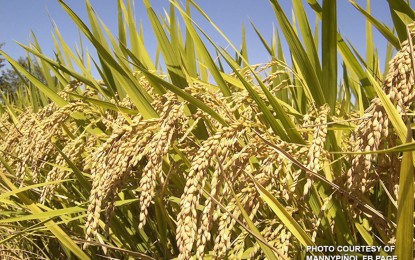
MANILA -- With rice tariffication in place, bulking up investments in research and development in agriculture and investing in irrigation, among others, can markedly increase rice yields and farm productivity in the long run, the National Economic and Development Authority (NEDA) said in a statement on Thursday.
NEDA, in partnership with the International Food Policy Research Institute (IFPRI), conducted an assessment on the projected impact of the removal of the quantitative restriction on rice and climate change on the agriculture sector.
Initial results were presented in a policy forum attended by representatives of concerned government agencies and non-government organizations in Pasig City.
“Before the rice tariffication law was passed, the government had been monopolizing the rice trade. This set-up had been restricting the flow of private funds going to the sector,” NEDA Undersecretary for Policy and Planning Rosemarie Edillon said.
Edillon said the much-awaited reform in the rice sector, which NEDA had advocated, would positively impact the agriculture sector and the whole economy in the succeeding years.
“We have conducted similar studies on this. But we want a model that integrates climate change into farmers’ decisions,” she added.
The preliminary results of the policy simulations done by NEDA and IFPRI show that, at the macro level, rice liberalization generates positive impacts on GDP across all sectors.
Under 35 percent tariff rate, GDP would improve by 0.44 percentage points. The agriculture sector would expand as there would be more crop diversification -- as uncompetitive rice areas shift to other high-value crops with relatively higher net returns.
Meantime, the world rice market is capable of supplying the additional import demand of the Philippines in the long run with minimal increases in world prices. The accessibility of affordable rice will contribute to lowering domestic rice prices that will benefit everyone especially the poor.
The study also emphasized the need to support local rice farmers by assisting them to improve productivity, providing cash transfers in the short run, and helping them in the adoption of climate-resilient technologies.
“The agriculture sector, particularly the rice sector, is vulnerable to climate shocks, which have been increasing in frequency and intensity. So we want to be prepared and provide interventions ahead of time,” Edillon said.
NEDA and IFPRI will consolidate inputs and recommendations, which arose from the policy forum, before releasing a policy note containing official results and recommendations.
Among those present in the forum were representatives from the Department of Agriculture and its attached agencies, Department of Agrarian Reform, Department of Trade and Industry, United Nation’s Food and Agriculture Organization, and non-government organizations, such as Samahang Industriya sa Agrikultura, Laban Konsyumer, Inc., and Federation of Free Farmers. (PR)
